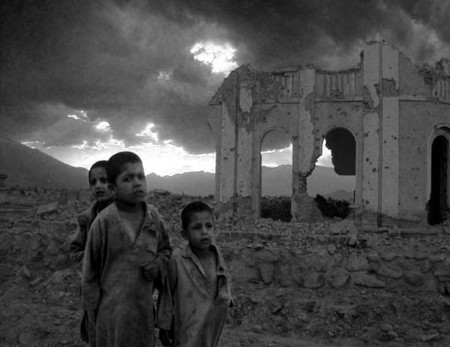By Wang Huazhong
It was an early morning in August, 5:50 am to be precise, not the time for children to have fun.
But youngsters bold enough to risk it had climbed onto the roofs of their mud houses that dot the hills in Kabul.
They were looking at a giant, black cloud rising from the ground not far away.
Five minutes ago, a car bomb had exploded and sporadic gunshots ripped through the quiet morning, the thick plumes of smoke now spreading a black shadow over the city.
Welcome to Kabul! A day ago, on the same roofs, the children were flying kites and smiling into China Daily reporters' cameras.
But a day seems like ages, especially to children.
According to its first-ever survey on the mortality rate, issued by Afghanistan's Ministry of Public Health in November, one in every 10 children in the country dies before reaching its fifth birthday.
The survey says about half of the deaths of children below 5 years are caused by respiratory infections or infectious or parasitic diseases.
The reason for that is not difficult to guess, for nearly a quarter of Kabul's population and half of Afghanistan's rural population do not have access to clean drinking water.
The survey does not mention them, but it is evident that millions of people in Afghanistan's drought-hit north are facing starvation and the threat of NATO air strikes which kill and maim civilians, and insurgents still recruit children, as is obvious from teenagers carrying automatic guns in the streets.

Children War Victims Kabul Afghanistan Black and White War Photography
They wash cars on congested roads, vend shampoo in sachets near Qargha Lake or simply beg around the old royal palace.
In a slum beside the Qargha Road, family members of Dad Ali and his three brothers have just returned from Iran, where they fled in 2007 to escape the ordeal at home.
"We had to leave everything behind at that time. If we hadn't, we wouldn't have found jobs and would have starved to death", says Ali, a swarthy faced man with a clean white Muslim cap sitting on his head.
On his return to Kabul in 2010, Ali had to pay only 6,000 afghanis (S$155) to build a 10-square-meter mud house.
Oilcloth and clay were applied on top of wooden planks to make the roof.
And windows were holes in the wall covered by a plastic film.
Ali says that since the men still cannot find jobs, the family relies on government subsidies and the children collect metal scraps and sell them to make some money.
There's a trace of blood in 12-year-old Jamshid's green eyes, a sign of the dangers that he has to go through.
In the "good old days", Jamshid could collect 2 kilograms of iron a week and hand in 50 afghanis to his parents.
Although free education is offered to every Afghan child, none of Ali's or his brothers' 33 children go to school.
"Father says school is too far from home. And we can't afford to buy cloths, pens and paper for school," mumbles Jamshid while drinking water from an iron kettle.
But that doesn't stop the boy, about to enter his teens, from saying that he wants to become a doctor when he grows up, "because I can help many people recover from illness in Afghanistan".
The will is there in Afghanistan. What is not is the means.



